A Gender and Age Sensitive Sexual & Gender Based Violence (S&GBV) Rights and Justice Course for Master Trainers Book of Abstracts

Foreword from the Convenor Course Staff Participant-Facilitators Course Participants' Take-Aways Overall Impact of the Course Block 3 Course Conference Programme Day 1 Programme Day 2 Programme Abstract and Bios Indigenous Pedagogical Resources and Tools If you want to go fast, walk alone. If you want to go far, walk together (African Proverb) 1 7 8 9 13 16 17 19 22 47
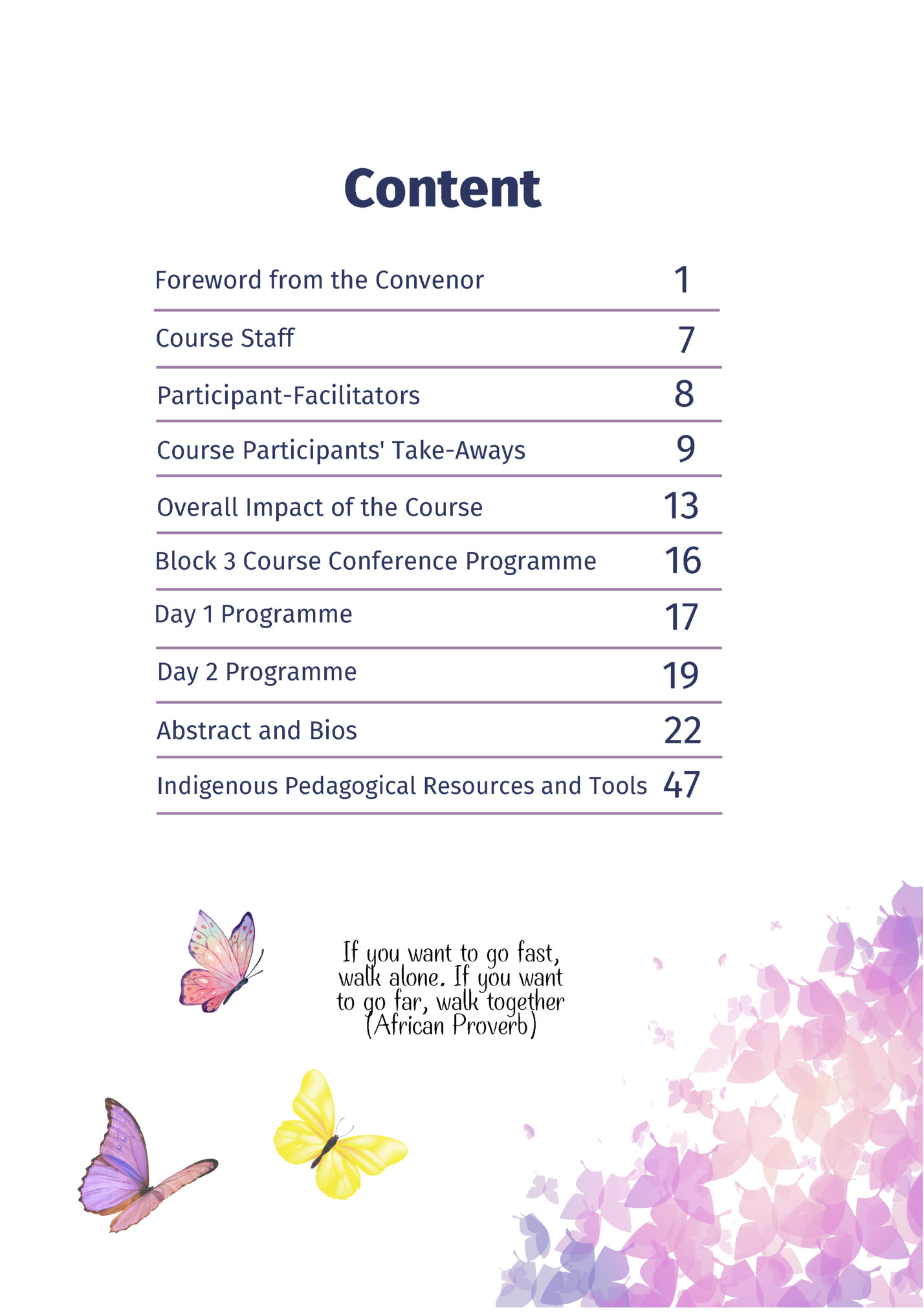
Auma Okwany Associate Professor, ISS-EUR Overall Project Director The Sexual and Gender Based Violence Rights and Justice Master Trainers’ Journey began in 2021, when a consortium led by The International Institute of Social Studies of Erasmus University Rotterdam (ISS-EUR), the African Governance Institute (AFRUGI) both in the Netherlands; The Center for SET-SRHR at Lira University and Capacity Development Partners (CDP) in Uganda proposed the project, ‘Strengthening Training and Education Partnerships on Sexual and Gender Based Violence for the Justice, Law, and Order Sector’ (STEPS for JLOS) in Uganda. S&GBV vulnerabilities and challenges remain persistent in Northern Uganda, while the mitigating and response systems are overextended. This is a consequence of the complex legacy of protracted violent conflict in this marginalized region of the country. The tailor-made training was funded by the Dutch Ministry of Foreign Affairs under the Orange Knowledge Programme through NUFFIC and was designed to strengthen partnerships in S&GBV training and education to promote sexual and reproductive justice. The overall outcome of the project was to enhance the human resource capacity of diverse justice, law and order sector actors at both institutional and community levels including judicial officers, police, NGOs, media, health workers, community leaders and influencers. Training was thus designed to transform knowledge, skills and shift their attitudes to inform and influence contextually grounded policy and practice in prevention, response and mitigation of S&GBV in Northern Uganda. A Decolonial Rights and Justice Curriculum Project activities were organized around a generative, gender and age sensitive S&GBV Rights and Justice curriculum in recognition that Uganda has the second youngest population in the world. This understanding also involved the application of an intersectional and decolonial lens to understand how power intersects with marginality to influence and maintain S&GBV vulnerabilities and challenges for differently located female and male youth, women and men in this post-conflict context. The curriculum was thus a transformative tool and training, a space and channel for co-creation, reflexive engagement, networking and improved practice. Curriculum development drew from the certified curricula of the Dutch-funded SET-SRHR project in Uganda (2016-2021) and OKP-funded projects on Youth Sexual and Reproductive Health Rights in Mozambique and Benin. These curricula are developed collaboratively, including input by subject experts and a- Page 1 | PGD Book of Abstracts
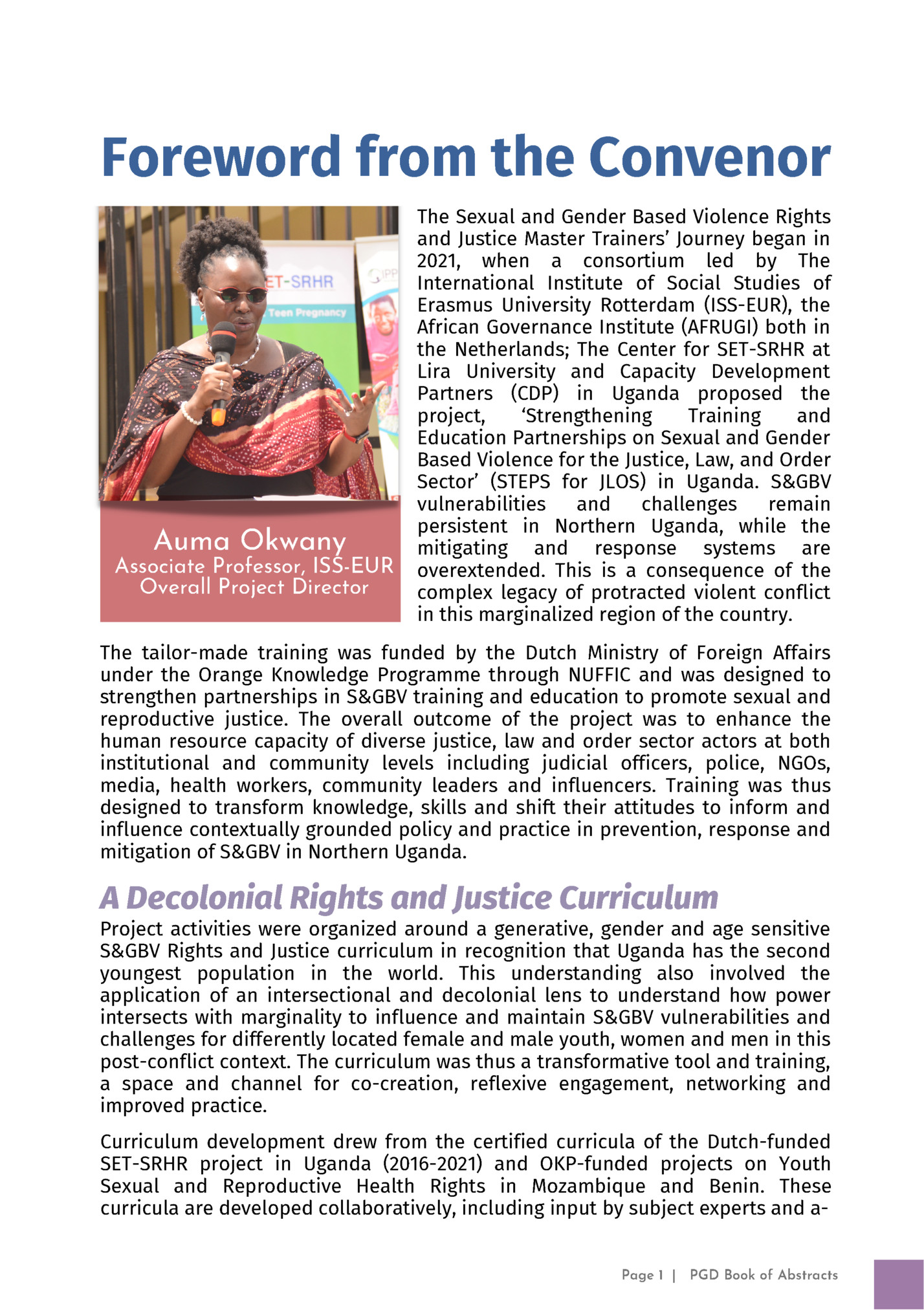
curriculum is generative because it was refined during the norm shifting conversations and engagement with diverse participants at different levels of delivery. This resulted in the development of four adaptations of the curriculum for four levels of professionals as follows: Benin S&GBV Rights & Justice Curriculum DSSR-BJ Training of JLOS YPET Uganda Mozambique for SRHR Master Trainers' Postgraduate Diploma Curriculum Institutional JLOS Training Curriculum Lead Actio ership -innT ( rain CurrLiAT) ing iculu m th You hip-iners ing Leadon Trainulum Acti ) Curric (LiAT Master Trainers: First Point of Cascade The postgraduate diploma course for Master Trainers targeted 30 purposively selected professionals from Lira University, CDP and partners in the justice law and order sector to receive certification as Master Trainers. This course was jointly delivered by ISS-EUR (as the lead and awarding institution), AFRUGI, ILGS, the Center for SET-SRHR at MakSPH and guest lecturers from Nascent RDO Kenya, Lira University and The London School of Economics. The training was co-hosted by CDP and the Center for SET-SRHR at Lira University. This course was the first point of cascade of training by Master Trainers, who subsequently delivered the curriculum within the project to three levels of professionals: 2 cohorts of Institutional JLOS, 2 cohorts of Community Leaders/Influencers and a third special cohort of Community Youth Leaders and Influencers. All four groups continue to disseminate their knowledge and skills through their networks to reach the projected milestone of 10,000 people. While the Master Trainers’ course was delivered in Uganda, we also drew 4 participants from partner projects in south Sudan to widen the outreach of the curriculum in the region. In this way, the course contributed to efforts by ISS-EUR through the projects that I coordinate to enhance collaboration and capacity exchange in the African region. The skills gained in this course have enabled participants to offer high-quality training, professional services and research in S&GBV while also laying the ground for their professional mobility including for further studies. Page 2 | PGD Book of Abstracts
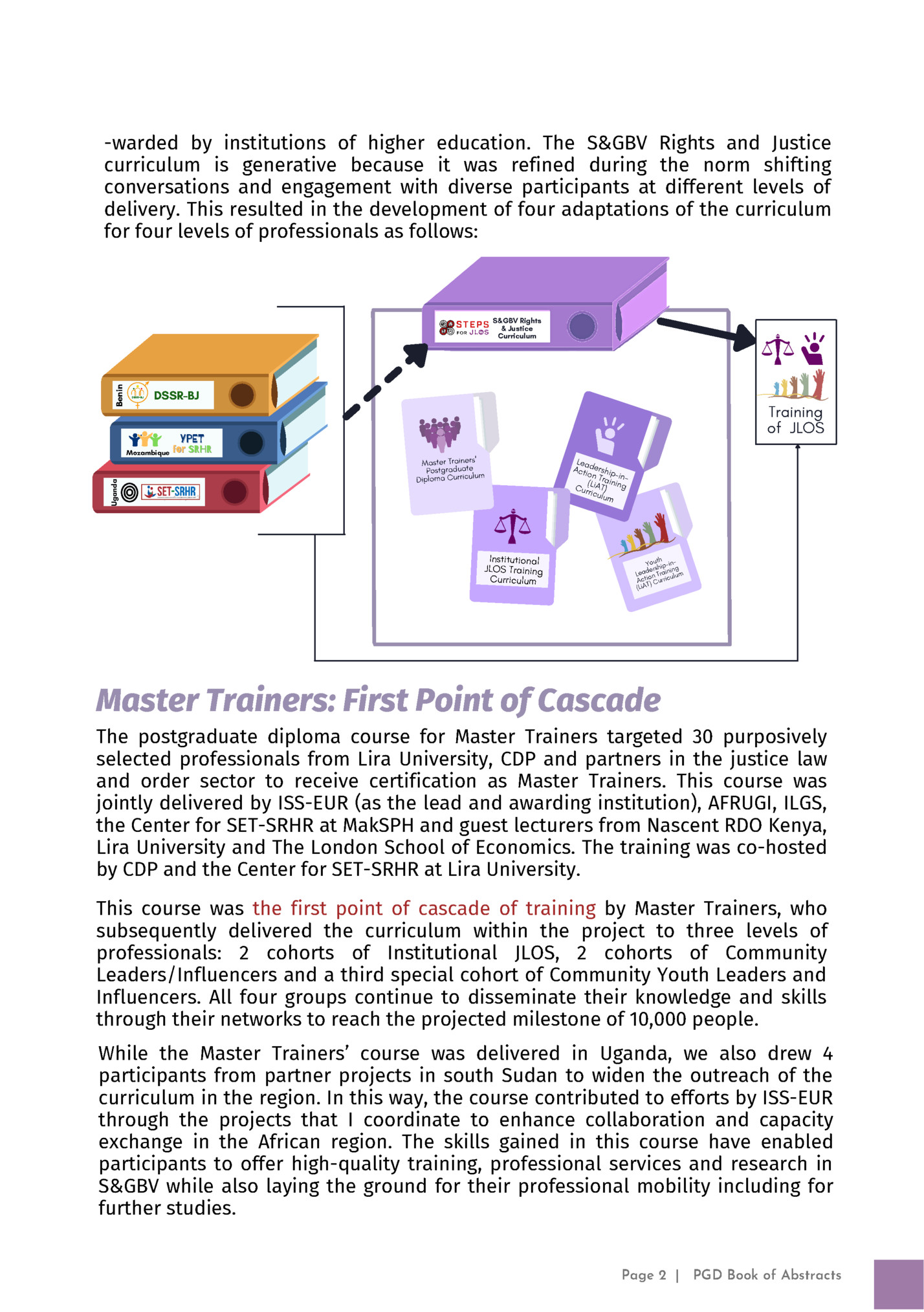
Trainers' Postgraduate Diploma Curriculum Insti JLOS tutiona l Curr Training iculu m Lea Acti dership on T -in(L rain Curr iAT) ing iculu m 30 Master Trainers 71 Justice, Law and Order professionals (Police, Probation officers, Public Prosecutors staff, Media) 89 Community Influencers (Local political, cultural, religious, women and youth leaders) 59 Youth Community Influencers Lea Youth Acti dersh (LiAT) on Traip-inCurr ining iculu m S&GBV is a complex, contextual issue mired in gendered and social norms, driven by inequalities and shaped by structural and cultural forces. Our interactive sessions included a range of reflexive conversations and critical discussions, in which we unpacked the roots and drivers of violence and justice. These sessions and change projects provided a space for transformative norm-shifting conversations which diverse participants cascaded through their personal and professional networks. On these journeys of transformation, delivery also took a decolonial approach to ground training in context while drawing on the rich history and resources of Africa. This is important as a solid starting point for sustainable solutions. It is also critical for disrupting conventional training practices that often exclude many practitioners from standardized, accredited education and training programs. This marginalization is intensified for grassroots actors who are often the first or only responders to violence within communities. In onward cascade conversations with practitioners and influencers within communities, master trainers used the anthill as a metaphor to discuss and analyse the complex cultural and structural forces underlying violence and justice. The visible portion of an anthill, is only a small part of the entire anthill. To truly get rid of ants requires digging deep beneath the anthill to tackle the huge intersecting complexity below the surface and reflect on pathways towards contextually grounded justice. Course Structure and Delivery Course delivery was tracked around 7 modules delivered via a blended approach over 3 blocks as follows: BLOCK I: Two week face-to-face Foundational Sessions (7th to 18th February 2022) Introduction to S&GBV Rights & Justice: Applying a Decolonial and Reproductive Justice Lens BREAK Introduction to contextually grounded S&GBV policy and practice. Key questions include: How are S&GBV issues understood, lived and (re)vitalized in local context and realities? Unpacking our 'toolboxes'- leveraging training assets and questioning our assumptions Strengthening pedagogical skills, tools and techniques Design and development of individual change projects 19th February to 6th March 2022 Page 3 | PGD Book of Abstracts
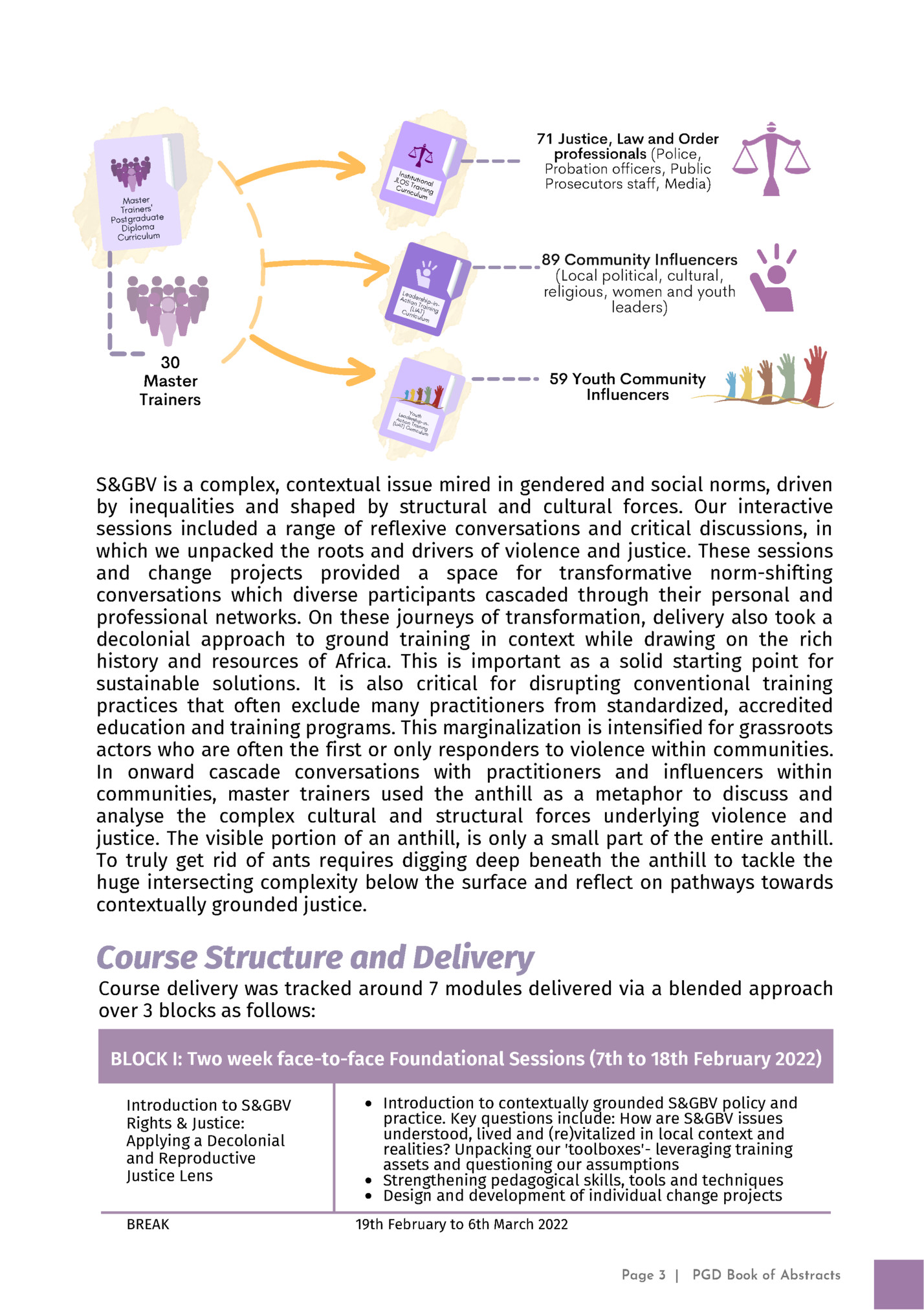
S&GBV policy and practice. In keeping with the course’ participatory approach, the reflexive conversations highlighted what each participant brought to the course. This was done as they unpacked their 'toolboxes’ in terms of sharing their knowledge, skills, pedagogical resources and indigenous knowledge. In addition to refining the transformative pedagogy approach designed to stimulate critical reflection on S&GBV rights and justice, the course strengthened their skills and competencies in decolonial place-based interactive facilitation skills, tools, and techniques for blended engagement (both online and face-to-face) in theory and practice. BLOCK II: Seven-week Online Phase (7th March to 5th June 2022) Seven-week online block aimed at deepening participant’s S&GBV knowledge and practice through: BREAK Issues study and case studies of S&GBV policy, practice and research Training-in-Action, cascading delivery of the S&GBV curriculum Development and implementation of change projects 6th to 10th June 2022 Engagement in the second block adopted a blended approach with virtual interaction through the Kipepeo Learning Management System (a platform that was set up as part of the SET-SRHR project), participant face-to-face group discussions and whole class sessions via Zoom. Conversations in this block provided opportunities for relational learning and reflexive experience sharing in understanding the magnitude, response, mitigation, redress and restorative systems of S&GBV rights and Justice. The sessions were interspersed with Training-in-Action at different levels. For the purposively selected group of Master Trainers who delivered the curriculum within the project, we also held refresher sessions both online and offline to scaffold their preparations and delivery of the curriculum. All master trainers continued to disseminate knowledge and training through their personal and professional networks while developing and implementing their change projects. They also reflected on their implementation of these projects in research papers which they developed for course assessment and for presentation. BLOCK III: Two-week face-to-face Concluding Block (11th to 23rd September 2022) Participant-led Course Conference Submission of papers for assessment Preparations for final presentations and discussants Course Conference- presentations and discussions of change projects aimed at enabling participants to demonstrate the knowledge and competencies acquired and developed throughout the course Page 4 | PGD Book of Abstracts
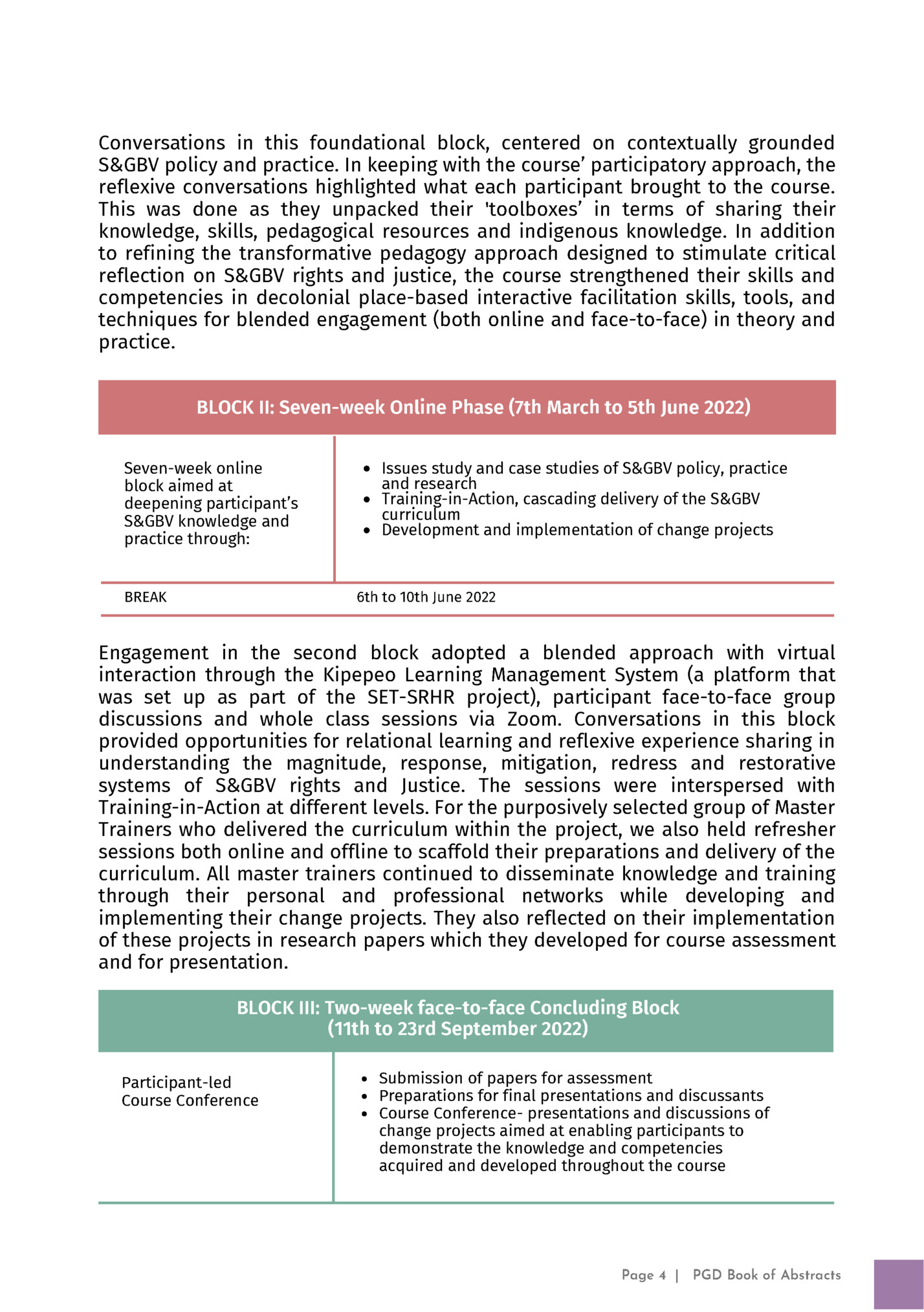
and competencies acquired and developed throughout the course. Activities included submission of their papers for assessment and preparing for presentation and discussion of their papers (including their role as peer discussants for assigned papers) during the two-day concluding course conference organised and led by participants. Transformation through the 'Way of Kipepeo' Like the participants whose journeys they facilitated, the Master Trainers went through a reflexive, interactive journey - termed ‘The way of Kipepeo’ and which they cascaded in their delivery of the curriculum. Kipepeo is the Kiswahili word for butterfly, the ultimate symbol of growth and transformation. The butterfly changes radically from a caterpillar which grows wings in the darkness and quiet of the cocoon and emerges reborn as a beautiful butterfly. Similarly, our training sessions and the change projects they developed and implemented were designed to sharpen their SRHR tools, enhance their skills and competences and strengthen their networks empowering them to be critically reflexive agents of change. Course delivery and the cascade process is symbolized by the image of a sunflower which carries thousands of seeds that represent the potential and possibilities that course participants plant and cross-pollinate as they disseminate knowledge through their personal and professional networks. Dear Master Trainers, What a privilege it was to go on this Kipepeo journey with you! Like the caterpillar you “ate” continuously during the course shedding your preconceptions, transforming your perspectives, as you adopted critically reflexive lenses and prepared to cascade training. The meaningful engagement with diverse participants at different levels of the course through these reflexive conversations valorized the input and knowledge of all participants. Indeed the open dialogue and reflexive norm shifting 'fireside' conversations enabled the cross-pollination and exchange of ideas of diverse professionals and are the essence of ‘sitting in a circle’ – a quintessential African strategy of looking for solutions in an inclusive and accountable manner. By the end of the project in 2022, we successfully delivered the S&GBV rights and Justice curriculum to a total of 249 practitioners in the JLOS sector, far exceeding our milestone of 150 participants. In addition to the four adaptations of the curriculum, there were spin-offs in the form of three additional adaptations developed by master trainers as their change projects (2 in Uganda and 1 in south Sudan). It has been my great privilege and pride to work collaboratively with all of you. I wish you all the best as we continue to co-create, rethink, unlearn, relearn and (re)tell the African story from African perspectives. This is not an end but is the beginning of other ‘Ways of Kipepeo’ because for our projects, the journey always continues… Congratulations to each and every one of you! Page 5 | PGD Book of Abstracts
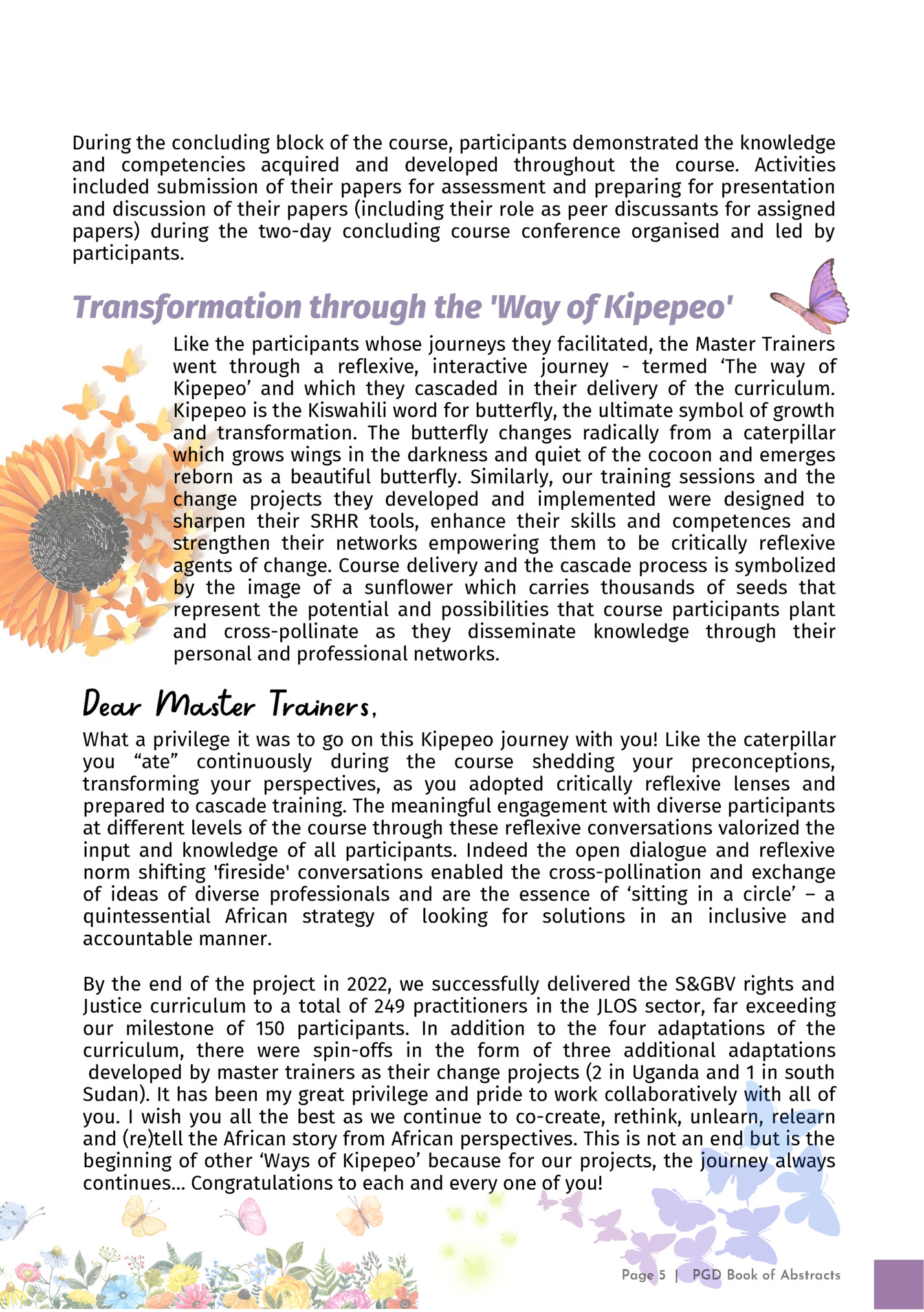
participants’ impact statements on their transformational journeys, the course conference program and each participant's biodata. Importantly, we also present the abstracts of their papers summarizing the change projects which show a wide range of S&GBV Rights and Justice topics implemented by master trainers as an outcome of the course. The Book of Abstracts conclude with an overview of the indigenous assets and resources used in the project logo and as pedagogical tools. Conclusion of the face-to-face Master Trainers PGD Course Block 1, with the Vice-Chancellor Prof. Ogwal-Okeng, Lira University Page 6 | PGD Book of Abstracts
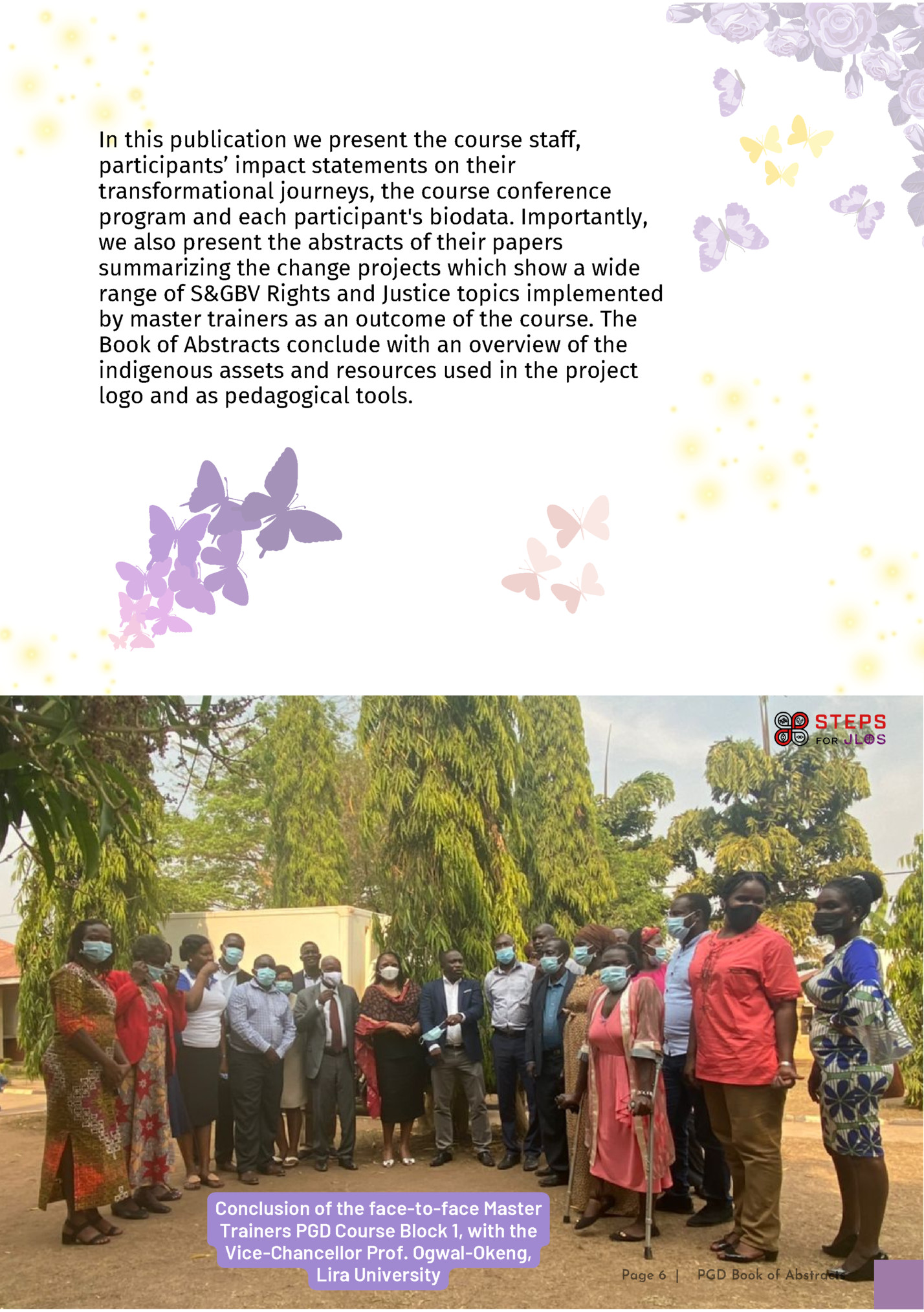
Auma Okwany Associate Professor (ISS-EUR) Overall Project Director, Course Convenor Nicholas Awortwi Associate Professor (ILGS) Executive Director, African Governance Institute (AFRUGI) Dr. Elizabeth Ngutuku Researcher, The London School of Economics Dr. Veronika Goussatchenko Project Manager, ISS-EUR Mr. Abraham Opito Technical Advisor, STEPS for JLOS Project Ms. Aurelia Munene Executive Director, Nascent RDO Page 7 | PGD Book of Abstracts
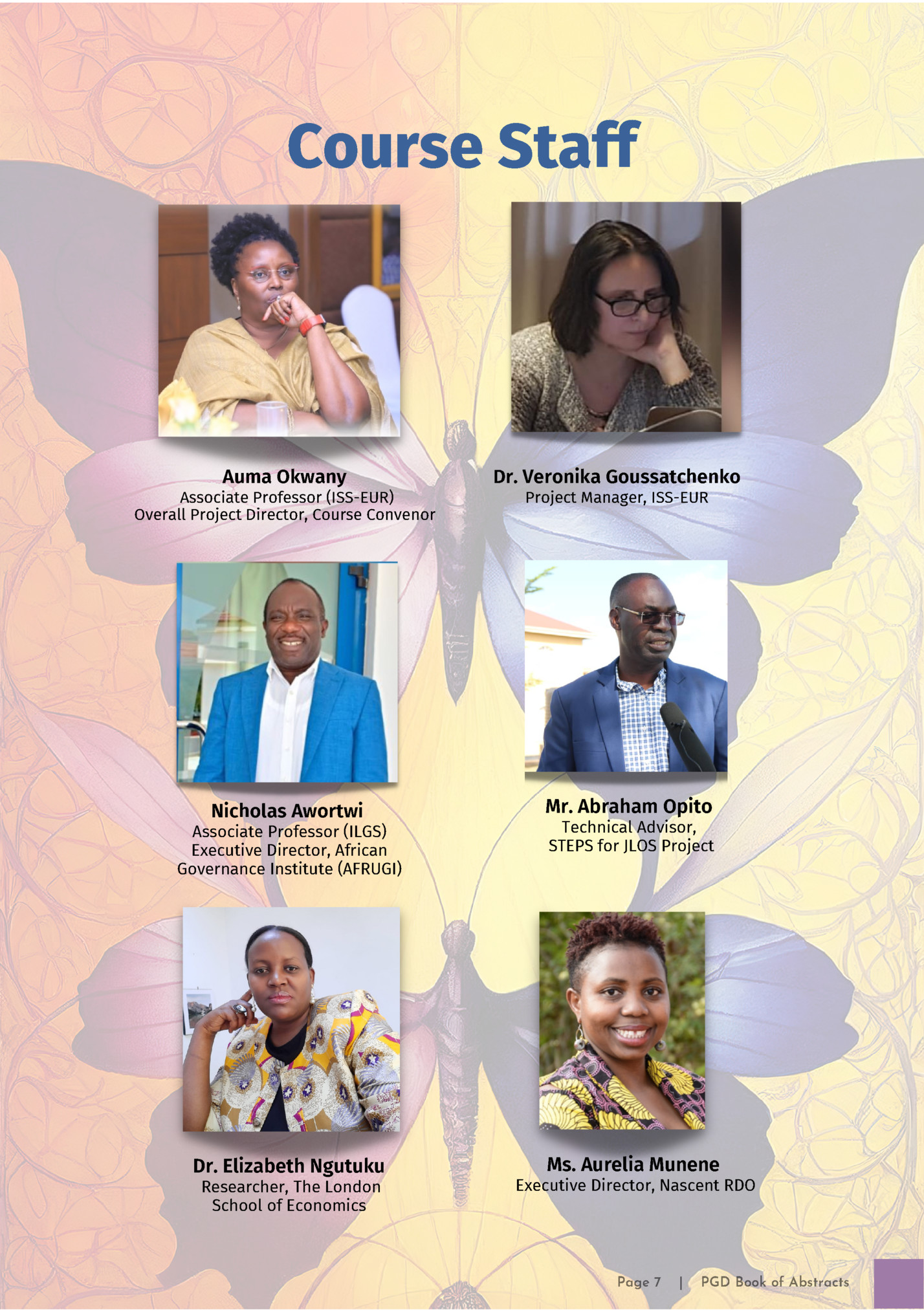
Fleepit Digital © 2021